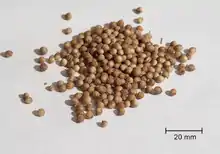coriander
English

Coriander seeds, dried.
Etymology
From Middle English coriandre, from Anglo-Norman coriandre, from Old French corïandre, from Latin coriandrum, from Ancient Greek κορίανδρον (koríandron), of uncertain origin. Doublet of cilantro.
cognates, etc.
Compare Ancient Greek κορίαννον (koríannon), κορίαμβλον (koríamblon), Mycenaean Greek 𐀒𐀪𐁀𐀅𐀙 (ko-ri-ha-da-na), 𐀒𐀪𐀊𐀅𐀙 (ko-ri-ja-da-na), 𐀒𐀪𐀊𐀈𐀜 (ko-ri-ja-do-no), 𐀒𐀪𐀍𐀅𐀙 (ko-ri-jo-da-na), and Akkadian 𒌑𒄷𒌷𒌝 (úḫurium).
Beekes supposes that cluster -dn- implies a Pre-Greek word, and hypothesizes that *koriaⁿdro- may have dissimilated to *koriaⁿdno-.
Pronunciation
- (Received Pronunciation) IPA(key): /ˌkɒɹiˈændə/
Audio (RP) (file) - (General American) IPA(key): /ˈkɔɹiˌændɚ/, /ˌkɔɹiˈændɚ/
- Rhymes: -ændə(ɹ)
Noun
coriander (usually uncountable, plural corianders)
- The annual herb Coriandrum sativum, used in many cuisines.
- The dried fruits thereof, used as a spice.
Synonyms
- (herb): Chinese parsley
- dhania
Meronyms
- (Coriandum sativum): cilantro (US, the leaves, when fresh); in other dialects, this, too, like the rest of the plant, is called coriander
Derived terms
Descendants
- → Japanese: コリアンダー (koriandā)
Translations
Coriandrum sativum plant
|
dried seeds of Coriandrum sativum plant
|
References
- Beekes, Robert S. P. (2010), “κορίαννον”, in Etymological Dictionary of Greek (Leiden Indo-European Etymological Dictionary Series; 10), with the assistance of Lucien van Beek, Leiden, Boston: Brill, →ISBN, page 754
Anagrams
This article is issued from Wiktionary. The text is licensed under Creative Commons - Attribution - Sharealike. Additional terms may apply for the media files.